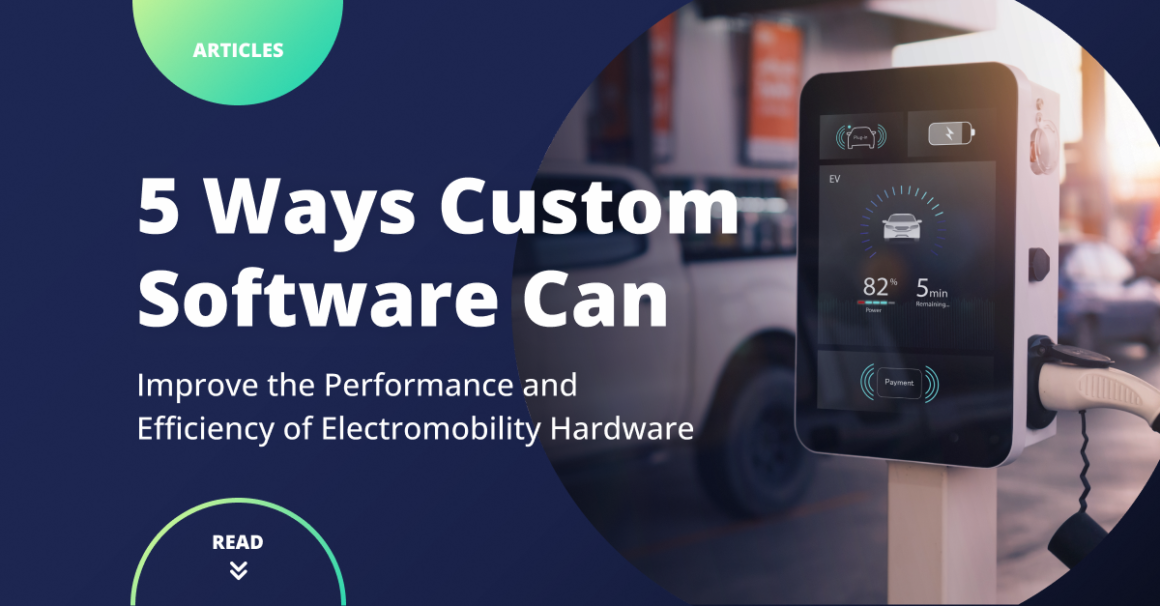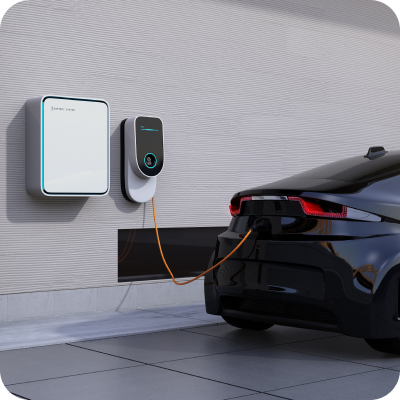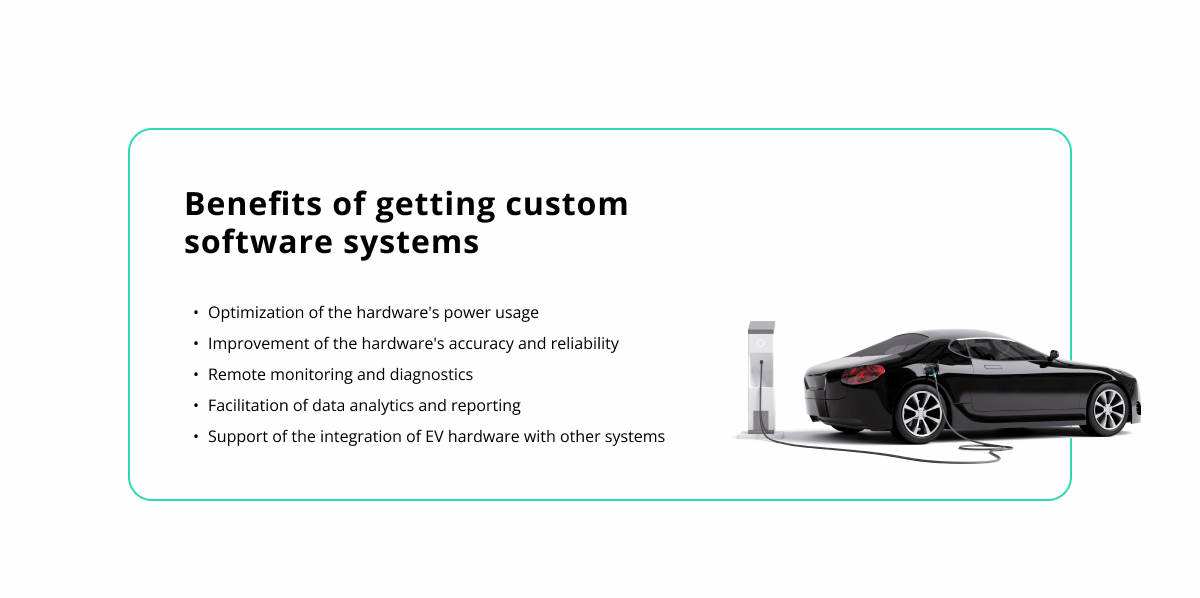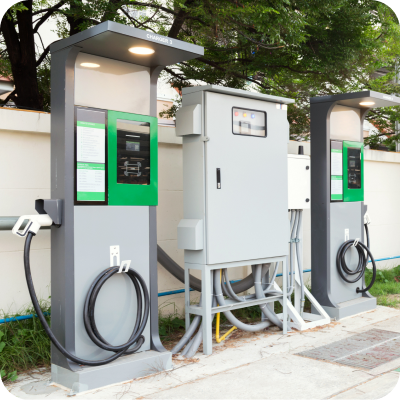5 Ways Custom Software Can Improve the Performance and Efficiency of Electromobility Hardware

Electric cars come with several benefits: they are silent, emit no harmful fumes, and in many cases, they are actually far cheaper to run than gasoline-powered cars. So it’s no wonder the number of electric cars on our roads is increasing rapidly.
The demand for EV services (EV charging stations, fleets, and repair services) is quickly growing as well. Actually, it’s growing so fast that business owners sometimes might feel a bit overwhelmed with running their business, monitoring their entire EV infrastructure, and on top of it, working to increase customer satisfaction and experience.
Thanks to custom-made software for EV business owners, running their own electric vehicles fleet or EV charging business and bringing more EV drivers to their business can become much easier.
How exactly? Grab a cup of tea or coffee and read on.
Why do EV companies need dedicated EV software for monitoring the performance of their EV-related hardware?
For electric vehicles, dedicated software is an essential part of the vehicles as it works as the “brain” of the car, controlling all aspects of the vehicle and monitoring its condition and performance. Thanks to this, the EV system can alert the driver the battery will need recharging soon, or one component inside the vehicle might malfunction.
Having dedicated software to monitor the equipment and hardware is equally important for EV businesses though, such as public charging stations or fleet owners. For example, if an EV driver attempts to charge at a nearby station, but the connection between the car and the charger keeps failing, then the driver will remember the charging station as the one that failed to meet his needs – and won’t return to it again.
The condition of the existing public charging station isn’t the best though, if we are to believe Channel 4’s investigation. In their program, Dispatches, they found that over 5.2% of the 26,000 public EV chargers they looked into were broken. That’s 1,352 EV chargers out of action.

Unless you have a dedicated team that can check the condition of the chargers, circuit boards, or batteries regularly though, then taking care of the entire infrastructure manually might be difficult to do.
Dedicated software for the Electric Vehicles industry, such as EV charging software or fleet management systems can come in handy here.
Since the number of EVs on the road is growing rapidly, the number of software solutions for the EV market is increasing as well. So whether you need a platform to manage an EV fleet or rather an ev charging solution for monitoring the charging station hardware, there will probably be several solutions available for you.
That being said though, it happens quite often that EV business owners can’t find a ready-made software solution with the features, capabilities, or integrations they need. For example, finding EV charging management software that can be integrated with renewable energy plants might be pretty complicated.
That’s when many of them start to think about designing a custom solution that could meet their main requirements and also be flexible enough so they could scale it in the future.
How can custom software help EV business owners take care of their equipment?
Seeing how much time and money it will take to develop custom software for their business model might feel a bit discouraging though. However, there are numerous benefits EV companies can gain by getting custom systems that make it well worth the investment in the long run.

For us, those five benefits are especially worth mentioning:
1. Optimize the power usage of electromobility hardware
In times when energy costs grow so fast, knowing how much energy your public charging stations or EV fleets take and where you can reduce the consumption is incredibly important. Manually monitoring the charging sessions of 20 cars inside the EV fleet or the entire charging station infrastructure isn’t exactly the most efficient or convenient way to do this though.
This is especially true if you have a dozen of different pieces of equipment and hardware used, for example, for electric vehicle charging, and each one comes with a separate application! And it’s even harder to do if you have not one but a few charging stations or fleet services, all of them in separate locations.
Dedicated software for energy management can make monitoring energy consumption much easier though. First, it will keep gathering data about the energy usage of every connected EV equipment, even those spread around the city (or country). The data will then be turned into charts and shown on the platform’s dashboard. You can then compare the performance of your equipment and determine which parts might need tweaking.
And while off-the-shelf solutions can do as much as well, you might have to spend more time integrating the hardware and infrastructure with the software. Custom solutions are made from the start to match the infrastructure though, so connecting them with the entire hardware used at your charging station or fleet company is much faster.
2. Improve the accuracy and reliability of the hardware
A second significant benefit of custom software is that it can give you much more reliable data about power usage, performance, and condition as well. As we mentioned above, configuring off-the-shelf solutions to work together with the hardware you are using might not be the easiest task as those only support a limited number or types of hardware.
For example, you might find out during the implementation that the ready-made charging station management platform doesn’t support the battery or charger type you are using. As a result, the platform can’t gather data about the equipment’s performance, or the data it shows might not be accurate.
Custom software is built to fit your infrastructure and hardware requirements perfectly, so you don’t have to worry about any equipment conflicts. Plus, thanks to the tight integration, you will also get far more detailed and reliable data about how each of the equipment performs – and what you could tweak for even better performance.
3. Enable remote monitoring and diagnostics
Now something that owners of several charging stations or fleet services might find incredibly helpful – remote diagnostics and maintenance. Manually monitoring the hardware and equipment used in one charging station or other EV business for any signs of wear or malfunctions is time-consuming enough. What if you have several locations to control?
That’s something custom software for EV hardware could handle for you as well. With the integrated sensors, the solution could monitor the entire infrastructure 24/7, schedule regular check-ups, and send notifications whenever it notices any suspicious behavior. For example, much higher energy usage than usual could suggest a malfunction. The message will also include the location of a malfunctioning device so you will know straight away where you should call a technician.
Being able to turn off a given device remotely can also come in handy, as this way, you can prevent further damage to the infrastructure – and costly repairs.

4. Facilitate data analytics and reporting
EV hardware and equipment create tons of data every day – data that can be incredibly valuable for growing your business. However, gathering, organizing, and making sense of the data manually is easier said than done. Equipment condition, performance metrics, electricity usage, charging, costs, operating costs, revenue, customer satisfaction – there’s just too much information to keep track of everything.
For EV-dedicated software though, collecting, sorting out, and turning the data into insights isn’t the slightest problem – it can keep gathering and analyzing the data 24/7, so you can be sure it won’t miss anything. Plus, the application can also turn the data into weekly or monthly reports, which you can then customize to suit your needs and use for financial audits or compliance reporting.
Most off-the-shelf software for the EV industry already has analytics, and reporting capabilities included to free business owners from having to collect the data themselves. However, those are typically tailored to the “general audience” so if you need unique or highly specialized metrics included in the analytics suite, going the bespoke route might be the best option for you.
5. Support the integration of EV hardware with other systems
You probably have many business tools and applications you regularly use in your EV company – CRM, billing, analytics, equipment condition monitoring, etc. Ideally, all those applications should be connected to the main EV management system so you wouldn’t have to add the same data into five systems or compare the data from different applications manually.
Finding an off-the-shelf solution with all or most of the integrations you need is a pretty tricky thing though, as most platforms have direct integrations for the most popular tools only. So often, businesses decide here to reach out to the software development team and develop their own custom software that would include all the integrations they require.
Another benefit here is if they decide to replace one or more applications, they can just ask the development team to add support for the new tools to the custom EV platform they are using. That way, you and your employees can get software that can fit seamlessly both the current but also the future tech stack.
How can Codibly help your EV company with custom software development?
Having a tailor-made platform for your EV company could help you and your staff with a number of things:
- Optimizing energy consumption;
- Reducing maintenance costs;
- Giving you plenty of valuable insights into how the equipment performs;
- Freeing the time you would otherwise spend on filling spreadsheets and creating manual reports.
At Codibly, we created a number of custom solutions for the EV industry, all tailored to each client unique needs. One of our clients was TrueEnergy, who needed a platform to control their EV chargers and battery storages, together with a demand/response system and an application for the EV owners.
For the project, we created:
- The backend system that can control smart charging according to the configured charge rules;
- Support for real-time Virtual to Grid process (Big Battery);
- Providing their Transmission system operator a flexibility time to help offload grid power consumption in a specific timeframe in the geographic regions controlled by the TSO;
- Building a solution for end-users to interact with public or B2B EV chargers.
In the same way as we built full-fledged custom software for them, we can help your EV company grow as well. Send us the project brief, and we’ll think together about how we can craft custom software that can meet your specific EV-related needs.

Conclusion
Using Off-the-shelf software for an EV company’s needs might be a good option if you want to start using an EV platform as soon as possible or are on a tight budget. However, those ready-made tools have a major drawback. Namely, they only have general features and integrations the majority of EV companies will find useful.
In case you need something a bit more tailored to your own needs, then going the bespoke route might be a better choice. While crafting custom software does take time (and budget), you’ll get a platform that will be made out of the features, capabilities, and integrations your own business needs the most.
If you already have an idea for a custom solution in mind, how about reaching out to our developers at Codibly with a project brief? Together, we can build a custom solution without which soon you won’t imagine your business.
contact us
Need expert guidance on your next energy project?
Reach out to us and discover how Codibly can offer tailored solutions to drive your business.